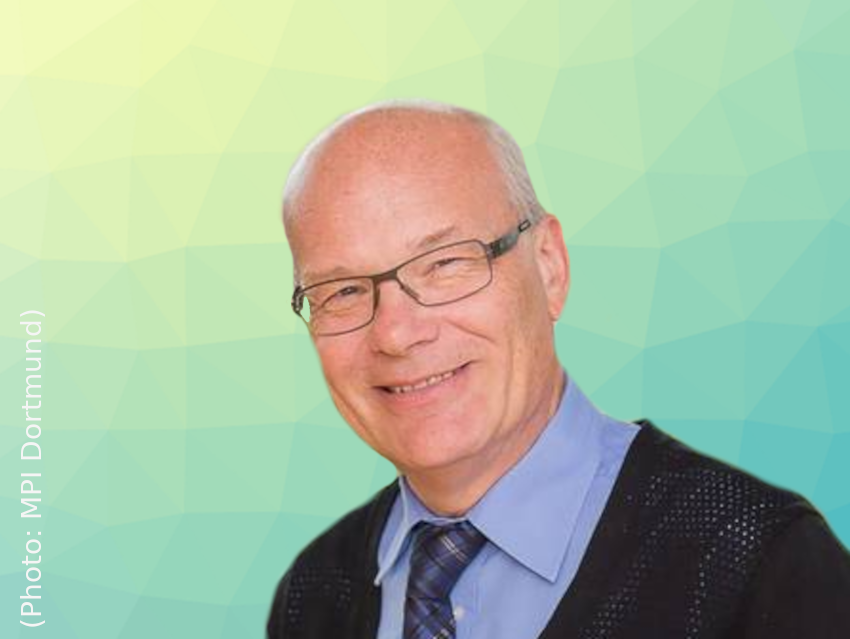Professor Herbert Waldmann, Max Planck Institute for Molecular Physiology, Dortmund, Germany, and Technical University (TU) Dortmund, has received the Otto Hahn Prize 2023.
The prize is awarded by the city of Frankfurt am Main, Germany, the German Chemical Society (GDCh), and the German Physical Society (DPG). It serves to promote science, particularly in the areas of chemistry, physics, and applied engineering, by recognizing outstanding scientific achievements and is endowed with EUR 50,000. The award ceremony took place on October 26, 2023, in the Paulskirche in Frankfurt am Main.
Herbert Waldmann is honored for significant contributions to establishing chemical biology as a research area and his decisive influence on the development of the discipline. His work inspired innovative research in the field of medicinal chemistry and paved the way for novel therapeutic interventions in, e.g., cancer research.
Research
Waldmann designed a new method to synthesize fully functional proteins. In addition, he developed a general conceptual framework for the design and synthesis of bioactive small molecules that modulate the function of proteins. These approaches have been successfully applied in biological research and provided new insights into important biological processes, such as signal transduction.
In particular, Waldmann has developed synthesis methods for the production of lipidated peptides and proteins for the study of cancer-relevant G proteins, such as the Ras/RasG system. He is also working on so-called pseudo-natural substances. These are biologically active substances with novel chemical frameworks that consist of building blocks of natural materials, but are not natural materials themselves. These compounds could be useful in drug development.
Life and Career
Herbert Waldmann studied chemistry at the University of Mainz, Germany, where he received his Ph.D. in 1985. After two years as a postdoctoral fellow working with George Whitesides at Harvard University, Cambridge, MA, USA, he returned to Mainz, where he completed his habilitation in 1991. He was appointed Professor of Organic Chemistry at the University of Bonn, Germany, in 1991 and moved to the University of Karlsruhe in 1993. Since 1999, he has served as Director of the Department of Chemical Biology at the Max Planck Institute of Molecular Physiology and as Full Professor of Organic Chemistry at TU Dortmund. Since 2005, he has also headed the Chemical Genomics Center of the Max Planck Society.
Among other honors, Waldmann has received the Carl Duisberg Award from the GDCh in 1992, the Otto-Bayer-Award in 2001, the Max-Bergmann Medal in 2003, the Emil Fischer Medal from the GDCh in 2012, an honorary doctorate from Leiden University, The Netherlands, in 2014, the Paul Karrer Medal from the University of Zurich, Switzerland, in 2017, and the Liebig Memorial Medal from the GDCh in 2020. He is a Member of the German National Academy of Sciences Leopoldina, the North Rhine-Westphalian Academy of Sciences, Humanities and the Arts, and the Academy of Sciences and Literature, Mainz.
Selected Publications
- Phenotypic profiling enables the targeted design of a novel pseudo-natural product class,
Sarah Zinken, Axel Pahl, Michael Grigalunas, Herbert Waldmann,
Tetrahedron 2023, 143, 133553.
https://doi.org/10.1016/j.tet.2023.133553 - Morphological subprofile analysis for bioactivity annotation of small molecules,
Axel Pahl, Beate Schölermann, Philipp Lampe, Marion Rusch, Mark Dow, Christian Hedberg, Adam Nelson, Sonja Sievers, Herbert Waldmann, Slava Ziegler,
Cell Chem. Biol. 2023, 30, 839–853.e7.
https://doi.org/10.1016/j.chembiol.2023.06.003 - A highly enantioselective intramolecular 1,3-dipolar cycloaddition yields novel pseudo-natural product inhibitors of the Hedgehog signalling pathway,
Jie Liu, Ruirui Zhang, Shubhadip Mallick, Sohan Patil, Chantal Wientjens, Jana Flegel, Anna Krupp, Carsten Strohmann, Corentin Grassin, Christian Merten, Axel Pahl, Michael Grigalunas, Herbert Waldmann,
Chem. Sci. 2023, 14, 7936–7943.
https://doi.org/10.1039/d3sc01240a - Morphological Profiling Identifies the Motor Protein Eg5 as Cellular Target of Spirooxindoles,
Jie Liu, Shubhadip Mallick, Yusheng Xie, Corentin Grassin, Belén Lucas, Beate Schölermann, Axel Pahl, Rebecca Scheel, Carsten Strohmann, Christoph Protzel, Thorsten Berg, Christian Merten, Slava Ziegler, Herbert Waldmann,
Angew. Chem. Int. Ed. 2023.
https://doi.org/10.1002/anie.202301955 - Fluorogenic probes for live-cell imaging of the cytoskeleton,
Gražvydas Lukinavičius, Luc Reymond, Elisa D’Este, Anastasiya Masharina, Fabian Göttfert, Haisen Ta, Angelika Güther, Mathias Fournier, Stefano Rizzo, Herbert Waldmann, Claudia Blaukopf, Christoph Sommer, Daniel W Gerlich, Hans-Dieter Arndt, Stefan W Hell, Kai Johnsson,
Nat. Methods 2014, 11, 731–733.
https://doi.org/10.1038/NMETH.2972 - The Pictet–Spengler Reaction in Nature and in Organic Chemistry,
Joachim Stöckigt, Andrey P. Antonchick, Fangrui Wu, Herbert Waldmann,
Angew. Chem. Int. Ed. 2011, 50, 8538–8564.
https://doi.org/10.1002/anie.201008071 - Highly enantioselective synthesis and cellular evaluation of spirooxindoles inspired by natural products,
Andrey P. Antonchick, Claas Gerding-Reimers, Mario Catarinella, Markus Schürmann, Hans Preut, Slava Ziegler, Daniel Rauh, Herbert Waldmann,
Nat. Chem. 2010, 2, 735–740.
https://doi.org/10.1038/nchem.730 - Chemical Strategies for Generating Protein Biochips,
Pascal Jonkheijm, Dirk Weinrich, Hendrik Schröder, Christof M. Niemeyer, Herbert Waldmann,
Angew. Chem. Int. Ed. 2008, 47, 9618–9647.
https://doi.org/10.1002/anie.200801711




